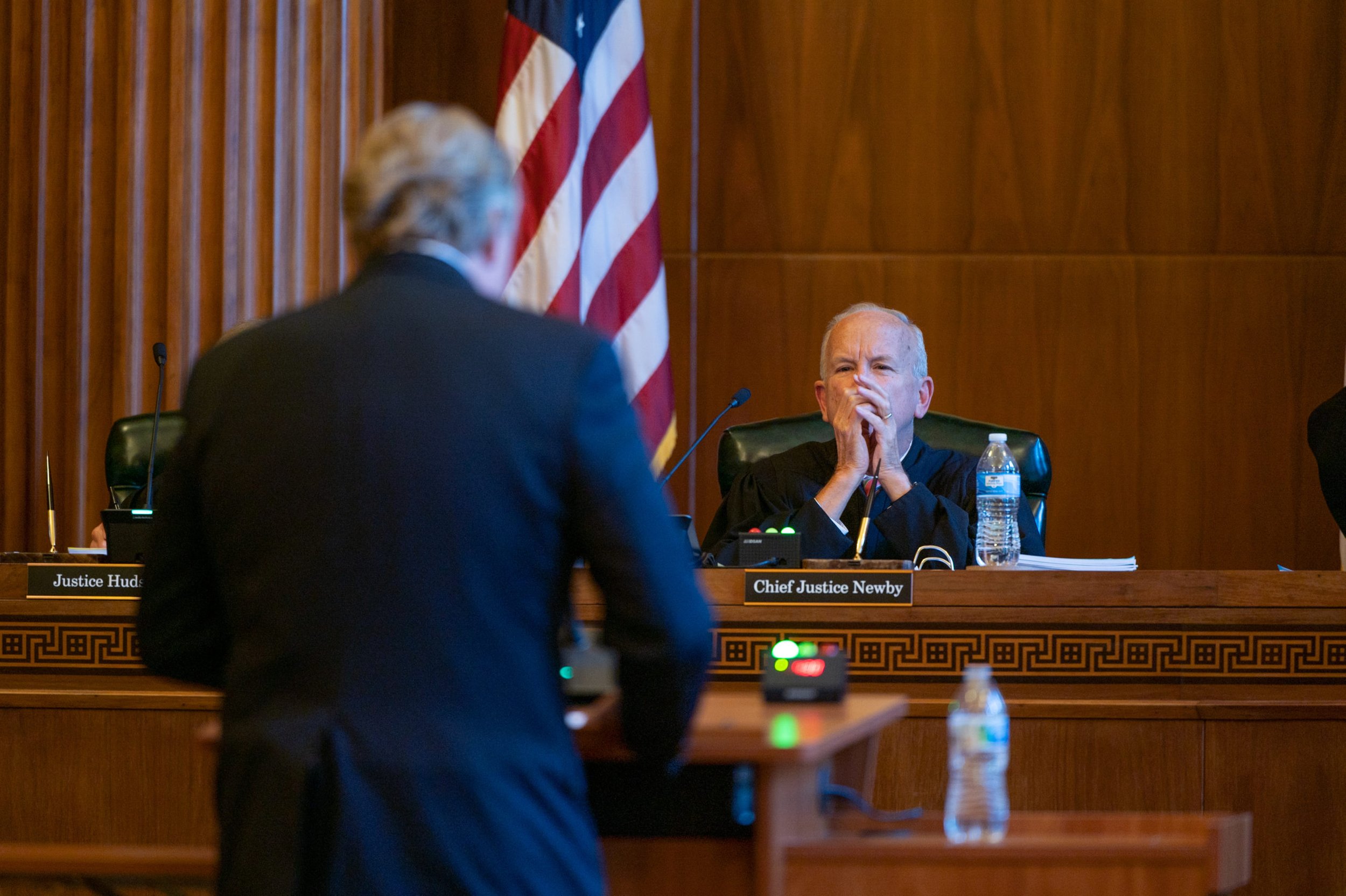Leandro judge sets off constitutional firestorm by ordering $1.7 billion
By David Bass, Carolina Journal
A retired Union County judge is trying to leapfrog the Republican-led N.C. General Assembly by ordering a $1.7 billion transfer from the state’s coffers to fund public education.
The transfer would bankroll two years of a remedial plan in the long-running Leandro school funding case that dates back to 1994. The price tag for the entire plan is $5.6 billion.
“This court for 17 years has granted every reasonable deference to the legislative and the executive branches of government to put together a plan. That simply has not occurred, for whatever reason. The court’s deference is at an end at this point,” said State Superior Court Judge David Lee in a hearing Wednesday, Nov. 10.
Lee said he hoped his $1.7 billion order would “minimize encroachment on legislative authority” and was “the least intrusive remedy that I can come up with.”
The order is stayed for a period of 30 days and is sure to be appealed. The move is the brashest yet by Lee and was met with an immediate backlash from Republican lawmakers who, by the letter of the state constitution, have the power of the purse.
"This case has devolved into an attempt by politically allied lawyers and the Governor to enact the Governor's preferred budget plan via court order, cutting out the legislature from its proper and constitutional role," said Senate leader Phil Berger, R-Rockingham, and House Speaker Tim Moore, R-Cleveland, in a joint prepared statement.
"If Judge Lee's orders are followed, the legislature's core duty is usurped by an unelected county-level trial judge and an out-of-state consultancy funded by the Governor and his political allies," Berger and Moore said.
"Thankfully, executive branch officials swear an oath to the Constitution, not to an unelected county-level trial judge," the legislative leaders added. "A judge does not have the legal or constitutional authority to order a withdrawal from the state's General Fund."
Berger and Moore question state attorneys' approach to the case.
"The only rebuttal to this clear precedent is an absurd theory developed by Attorney General Josh Stein, which argues that the Constitution, in 1868, ordered a specific funding level for the education budget in the year 2021, and that only an out-of-state consultancy called WestEd can divine the precise funding level the 1868 Constitution ordered."
"It's a circus," Berger and Moore concluded.
“Leandro is not a moral crusade. It’s a money grab,” said Dr. Terry Stoops, director of the Center for Effective Education at the John Locke Foundation. “Today, Judge Lee trampled the North Carolina Constitution and embraced a brazen scheme to sidestep the elected members of the General Assembly and raid the public purse.”
The transfer would break down into $1.5 billion allotted to the state Department of Public Instruction, $189.8 million to the Department of Health and Human Services, and $41.3 million to the University of North Carolina System.
Meanwhile, the original jurist overseeing the Leandro case — retired Wake County Judge Howard Manning — released a memo Tuesday, Nov. 9,
questioning any judge's ability to force another branch of government to carry out his order.
“Reduced to essentials, in my opinion the children are not being provided the opportunity because after all the millions spent, 90% of school costs are for adult salaries and benefits, and the data shows as it did years ago and up to now the educational establishment has not produced results,” Manning wrote.
Democrats voiced support for the transfer.
“The N.C. General Assembly has failed our children,” said Sen. Gladys Robinson, D-Guilford, at a press conference Tuesday. “This case and the actions that the court will take this week are about more than our constitutional obligations. It is a moral obligation.”
“Republican leadership has thumbed its nose at the court and the judiciary,” added Sen. Jay Chaudhuri, D-Wake. “We continue to deny and delay our school children the chance to receive a sound, basic education.”
Stein steps in
Stein, a Democrat, stepped into the fray on Monday by issuing a memo to Lee suggesting the judge could legally bypass lawmakers and order the $1.7 billion transfer from the treasury. Stein represents the defendants in the case, which includes the state government as a whole and the N.C. State Board of Education.
Moore issued a statement blasting Stein for viewing the state constitution as “a suggestion” and seeing “a mandate where none exists.”
“The legislative branch is the closest to the people. And the people were loud and clear when they elected their representatives in the General Assembly to do their jobs as outlined in our constitution,” Moore said. “How many times will the courts tell North Carolinians their vote doesn’t matter?”
Sen. Deanna Ballard, R-Watauga, also put out a statement taking Stein to task.
“Attorney General Stein’s ‘defense’ is yet more evidence that this circus is all about enacting Gov. [Roy] Cooper’s preferred spending plan over the objections of the legislature, the only branch legally authorized to make spending decisions,” she said.
On Monday, Berger distributed a press release citing a number of statutes and instances of case law to bolster the GOP’s position that lawmakers have sole discretion in allocating state funding.
The state constitution stipulates that “No money shall be drawn from the State treasury but in consequence of appropriations made by law, and an accurate account of the receipts and expenditures of State funds shall be published annually.”
A recent state Supreme Court case from December 2020 backed up this provision, ruling that “'[t]he power of the purse is the exclusive prerogative of the General Assembly,’ with the origin of the appropriations clause dating back to the time that the original state constitution was ratified in 1776.”
Funding sources revealed
The remedial plan was based in large part on a 300-page report created by the San Francisco-based consulting firm WestEd. WRAL unearthed documents showing the price tag of that report — $2 million — and who funded it.
The tab was paid through a combination of public and private funds, including gifts from local foundations that frequently support progressive causes. For example, the Z. Smith Reynolds Foundation kicked in $200,000, while the A.J. Fletcher Foundation contributed $50,000.
As for taxpayer dollars, the state Department of Health and Human Services chipped in $600,000 and the Department of Administration another $200,000.
Budget stalemate
Lee’s order comes as lawmakers continue negotiations with Cooper over a budget for the new biennium. Cooper’s proposed budget would fully fund two years of the remedial plan, just as Lee’s order does.
Versions of the budget passed by the House and Senate earlier this year would fund components of the Leandro mandates, including $8.6 million over the next two fiscal years in teacher recruitment bonuses for low-wealth or high-needs schools; $5.2 million for N.C. pre-K; $3.8 million for cooperative and innovative high schools; and $10.5 million for career and technical training credentialing.
This week, state Superintendent of Public Instruction Catherine Truitt, a Republican, sent a letter to Cooper and GOP leadership in the General Assembly urging them to come to terms on a budget as quickly as possible. The state hasn’t had a new General Fund budget since 2018-19 due to vetoes from Cooper.
“While I understand that negotiations continue to play out, I want to make it clear that the Department of Public Instruction — and NC’s K-12 education system at large — is facing considerable obstacles while we wait in limbo,” Truitt said. “If a budget is not signed, hardship will be experienced, yet again, across our state with severe implications for our students, our teachers, and our school support staff.”



